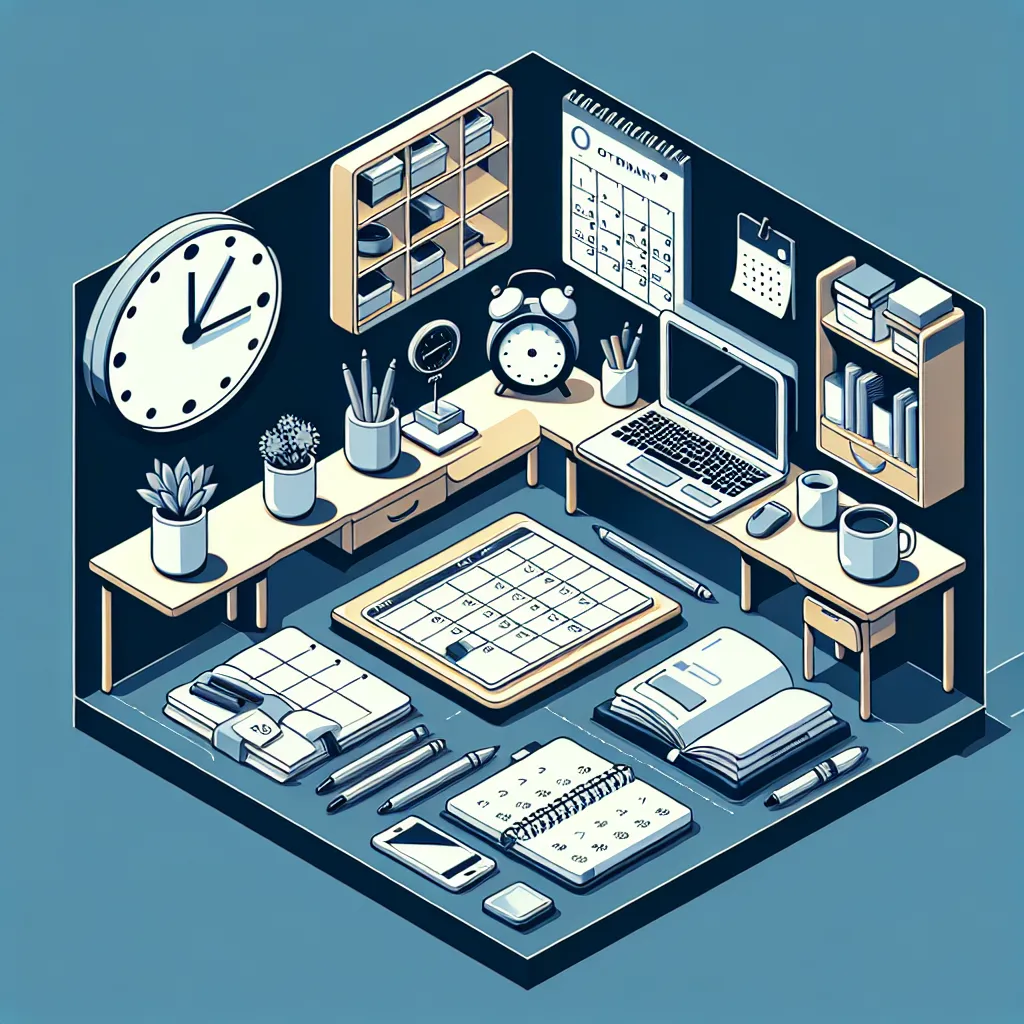Prioritize Your Tasks Wisely
When it comes to effective time management, one of the most crucial aspects is prioritizing your tasks wisely. With so many demands on our time, it’s essential to prioritize and focus on the most important and urgent tasks first. Here are top 10 tips for time management to help you prioritize your tasks wisely:
- Identify Important Tasks: Take the time to identify the most crucial tasks that need to be completed.
- Urgent vs. Important: Distinguish between tasks that are urgent and those that are important. Focus on the important ones first.
- Use a Priority Matrix: Consider using a priority matrix to categorize tasks based on their urgency and importance.
- Set Clear Goals: Clearly define your goals and objectives to know which tasks align with them.
- Evaluate Deadlines: Understand the deadlines associated with each task and prioritize accordingly.
- Learn to Say No: Don’t take on more than you can handle. Learn to decline tasks that don’t align with your priorities.
- Delegate When Possible: If you have the option to delegate tasks, do so to free up time for high-priority responsibilities.
- Revisit and Adjust: Regularly revisit your task list and make adjustments based on changing priorities.
- Avoid Multitasking: Focus on one task at a time to ensure better quality and efficiency.
- Utilize Technology: Use time management tools and apps to help prioritize and organize your tasks effectively.
Prioritizing your tasks wisely is fundamental to effective time management, enabling you to focus on what truly matters and achieve your goals efficiently.
Set Achievable Goals
Setting achievable goals is a crucial aspect of effective time management. When creating a to-do list or setting objectives for the day, it’s important to be realistic about what can be accomplished in a given time frame. Unrealistic goals can lead to frustration and a sense of failure, ultimately derailing productivity. It’s essential to prioritize tasks based on their importance and deadlines, allowing for a clear focus on the most critical objectives. By breaking down larger projects into smaller, more manageable tasks, it becomes easier to track progress and stay motivated.
Additionally, setting achievable goals helps in maintaining a sense of control and reducing stress. When individuals set realistic expectations for themselves, they are more likely to experience a sense of accomplishment as they complete each task. This, in turn, can boost motivation and overall productivity. It’s important to remember that setting achievable goals does not mean settling for mediocrity; rather, it’s about setting the stage for success by creating a practical roadmap for making progress.
In the context of time management, setting achievable goals requires a balance between ambition and realism. By acknowledging personal limitations and considering external constraints, individuals can set themselves up for success while avoiding burnout. Ultimately, the process of setting achievable goals is about being honest with oneself and finding a sustainable approach to productivity.
Minimize Distractions
When it comes to effective time management, minimizing distractions is crucial. Distractions can eat up a significant amount of time and hinder productivity. Here are top 10 tips for minimizing distractions and boosting your efficiency:
1. Identify your main distractors: Take note of the things that tend to pull your focus away from tasks, whether it’s social media, email notifications, or noisy environments.
2. Create a designated work area: Establish a specific space for work or studying to signal to your brain that it’s time to focus.
3. Set clear boundaries: Communicate to those around you when you need uninterrupted time to work, and set boundaries to minimize interruptions.
4. Utilize time management tools: There are numerous apps and tools designed to block distracting websites or limit time spent on them.
5. Schedule focused work periods: Allocate specific blocks of time for concentrated work, and use techniques like the Pomodoro method to structure your tasks.
6. Prioritize tasks: By knowing what needs to be done first, you can maintain focus on the most important tasks and avoid feeling overwhelmed.
7. Practice mindfulness: Mindfulness techniques can help bring your attention back to the present moment and reduce the impact of distractions.
8. Take regular breaks: Allowing yourself short, scheduled breaks can prevent burnout and reduce the urge to be distracted during work periods.
9. Manage your notifications: Turn off non-essential notifications on your devices to minimize the temptation to check them constantly.
10. Reflect and adjust: Regularly assess your progress in minimizing distractions and adjust your strategies as needed to find what works best for you.
By implementing these tips and being mindful of potential distractions, you can take control of your time and maximize your productivity.
Utilize Time Management Tools
When it comes to effective time management, utilizing time management tools can make a significant difference in productivity and efficiency. There are a plethora of tools available that can aid in better organizing and prioritizing tasks, as well as tracking time spent on specific activities. Here are the top 10 tips for making the most of time management tools:
- Identify Your Needs: Determine the specific areas where you struggle with time management to select the most suitable tools.
- Explore Different Options: Research and try out various time management tools such as Trello, Asana, or Todoist to find the one that best fits your workflow.
- Set Up Reminders: Use tools that offer reminder features to ensure important deadlines and appointments are not missed.
- Utilize Calendar Apps: Sync your tasks and appointments with calendar apps like Google Calendar or Outlook to have a comprehensive view of your schedule.
- Track Your Time: Consider using time tracking tools such as Toggl or RescueTime to monitor how you spend your time and identify areas for improvement.
- Prioritize Tasks: Utilize tools that allow for easy prioritization of tasks to focus on the most important and time-sensitive activities.
- Collaborate Effectively: For team projects, utilize collaborative tools like Slack or Microsoft Teams to streamline communication and task management.
- Manage Your Email: Use email management tools like Boomerang or SaneBox to schedule emails and keep your inbox organized.
- Stay Organized: Implement tools that facilitate organization, such as Evernote or Microsoft OneNote, to store and access important information efficiently.
- Regularly Evaluate and Adjust: Continuously assess the effectiveness of the tools you use and make adjustments as needed to optimize your time management process.
By leveraging the right time management tools, individuals can enhance their ability to plan, prioritize, and manage their time more effectively, ultimately leading to increased productivity and reduced stress.
Take Regular Breaks
One of the key aspects of effective time management is the importance of taking regular breaks. It may seem counterintuitive, but taking short, scheduled breaks during your workday can actually improve productivity and focus. Research has shown that our brains have a limited capacity to focus intensely for long periods of time, and taking breaks can help to replenish this cognitive capacity. Additionally, regular breaks can prevent the onset of decision fatigue, which can lead to poor decision-making and productivity. It’s essential to listen to your body and mind, and take breaks when you start to feel drained or unfocused.
To incorporate regular breaks into your schedule, try the Pomodoro Technique, which involves working for 25 minutes and then taking a 5-minute break. After four work intervals, take a longer break of 15-30 minutes. This structured approach can help you stay focused during work sprints and prevent burnout. Remember, the key is to use breaks effectively, so avoid getting sidetracked by unrelated tasks during your break time. Instead, use breaks to stretch, take a short walk, or practice mindfulness to rejuvenate your mind and body.
In conclusion, taking regular breaks is a crucial component of effective time management. By incorporating short, strategic breaks into your workday, you can improve your overall productivity, maintain focus, and prevent burnout.
Learn to Delegate Effectively
Effective time management is crucial for maintaining productivity and reducing stress in both personal and professional life. When it comes to managing time effectively, learning to delegate tasks is a key skill to master. Delegating effectively involves entrusting the right tasks to the right people, and it can significantly free up time for more high-priority responsibilities. Here are top 10 tips for time management, with a focus on the aspect of learning to delegate effectively.





